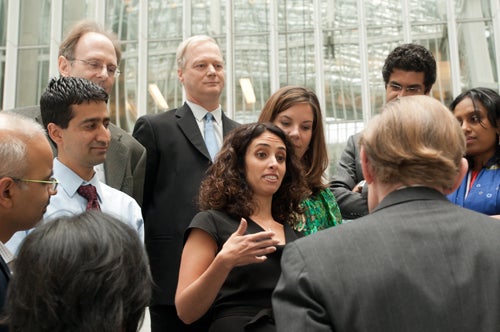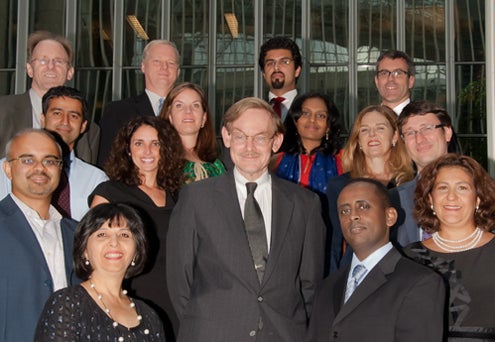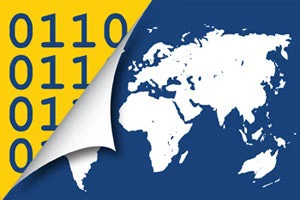A couple of weeks ago some of the original members of the team that helped make the World Bank's data freely accessible and open had an opportunity to meet with the outgoing President of the World Bank, Bob Zoellick; his enthusiasm and commitment to modernizing the World Bank and making it more open has been a key factor in the success of the Bank's Open Data Initiative – and some regard it as a hallmark of his tenure.
He was keen to thank the many people that came together behind the common objective of making the Bank's data easier to find and easier to use. And he had a question for us: what's next? We've posted some thoughts about that before, but what did we tell the President?

Some of us talked about the coverage of the datasets that the Bank makes available, expanding both data on what Bank staff know - like development indicators, and data on what Bank staff do and what they support our clients to do – like procurement and contracts. Monitoring – and sharing – usage and feedback will help us focus on the most relevant datasets; for instance we know that citizens are often looking for more local data. And we need to maintain a focus on data quality - providing information about data quality to users.
All that means making sure that Open Data is something that the Bank does, not something that we did – especially, perhaps, in the Bank's operational work – so that there is a culture of making data freely available.
Some of us mentioned the need to improve ways to help users interact with the data, with innovative access tools and data products. We've documented substantial data collections, such as the survey microdata catalog, and one of the challenges is to get more of the data used – by Bank staff and by others - to improve knowledge and research. Finding better ways to link datasets together, and to other elements of knowledge - like the World Development Reports, is another, so that data can better inform policy making and the Bank's operational work. And what about discovering innovative ways to make use of new "big data" for development?
Many of us stressed the need to reach out to the countries that are our clients, with help for their own Open Data initiatives. While our datasets and experiences are likely to be different from those of national or regional governments, efforts to make public datasets open can improve the effectiveness of public services and government processes. Citizens are interested in transparency: they want to know how their money gets spent, where it goes and for what. There is much work to do to support countries with producing datasets that are both hyperlocal and hyperuseful.
So who are the team behind the Open Data Initiative? It's important to recognize that many, many people are involved, and that they come from many different parts of the organization – from the statisticians, data collectors and curators (I class myself as one of those…), to the information systems developers, to the innovators, communications and online design specialists. One of the features of the Open Data initiative is that the collaboration around the common purpose of getting data used for the benefit of development has been extraordinary. Unfortunately they couldn't all be at the meeting with Mr Zoellick – but here are those that were there:

Back row, left to right: Will Prince – data administration and quality; Olivier Dupriez – household survey development; Tariq Khokhar, our Open Data evangelist; Neil Fantom (myself), manager of the Bank's Open Data initiative
Second row, left to right: Rahyab Lari, systems lead for projects and operations data; Sandra Moscoso, analyst for Open Financial Data; Nicole Frost, web program lead; Malar Veerappan, systems lead for development data and APIs; Jane Campbell, manager of Open Financial Data; Soren Gigler, lead for Mapping for Results
Front row, left to right: Aleem Walji, lead for innovation; Shaida Badiee, the Director responsible for the Open Data Initiative; Robert Zoellick, President, World Bank; Jomo Tariku, communication and design; and Azita Amjadi, team lead for Open Data communication and client services.



Join the Conversation